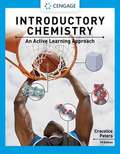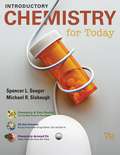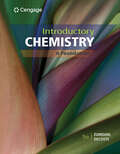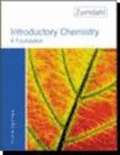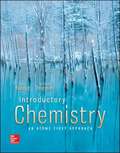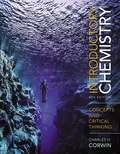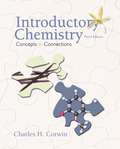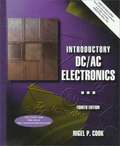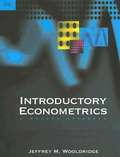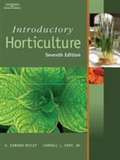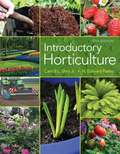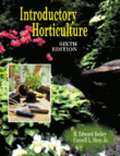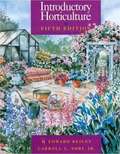- Table View
- List View
Introductory Chemistry
by Nivaldo J. TroBuilds 21st century and problem solving skills, preparing students for success Now in its 6th Edition, the best-selling Introductory Chemistry continues to encourage student interest by showing how chemistry manifests in students’ daily lives. Author Nivaldo Tro draws upon his classroom experience as an award-winning instructor to extend chemistry from the laboratory to the student’s world, capturing student attention with relevant applications and an engaging writing style. The text provides a superior teaching and learning experience, enabling deep conceptual understanding, fostering the development of problem-solving skills, and encouraging interest in chemistry with concrete examples. Extending chemistry from the lab to the student’s world, the text reveals that anyone can master chemistry. Refined to meet its purpose of teaching relevant skills, the 6th Edition includes new questions, data, and sections to help students build the 21st century skills necessary to succeed in introductory chemistry and beyond. Already a visual text, in this edition the art has been further refined and improved, making the visual impact sharper and more targeted to student learning. The new edition also includes new Conceptual Checkpoints, a widely embraced feature that emphasizes understanding rather than calculation, as well as a new category of end-of-chapter questions called Data Interpretation and Analysis, which present real data in real life situations and ask students to analyze and interpret that data.
Introductory Chemistry : An Active Learning Approach
by Edward Peters Mark CracoliceLearn the skills you need to succeed in your chemistry course with INTRODUCTORY CHEMISTRY: AN ACTIVE LEARNING APPROACH, 7th Edition. Known for threaded remediation of topics, this text assumes no prior knowledge of Chemistry. This proven resource will help you every step of the way as you develop the skills you need write routine chemical formulas and equations, set up and solve chemistry problems, think about fundamental chemistry on an atomic or molecular level, and visualize what happens in a chemical change. The text combined with the online resources and instant feedback in OWLv2 sets you on your way to developing a deeper understanding of chemistry concepts and solving complex problems in all aspects of your life.
Introductory Chemistry Essentials
by Nivaldo TroNow in its 6th Edition, the best-selling Introductory Chemistry continues to encourage student interest by showing how chemistry manifests in students'' daily lives. Author Nivaldo Tro draws upon his classroom experience as an award-winning instructor to extend chemistry from the laboratory to the student''s world, capturing student attention with relevant applications and an engaging writing style. The text provides a superior teaching and learning experience, enabling deep conceptual understanding, fostering the development of problem-solving skills, and encouraging interest in chemistry with concrete examples. Extending chemistry from the lab to the student''s world, the text reveals that anyone can master chemistry. <p><p> Refined to meet its purpose of teaching relevant skills, the 6th Edition includes new questions, data, and sections to help students build the 21st century skills necessary to succeed in introductory chemistry and beyond. Already a visual text, in this edition the art has been further refined and improved, making the visual impact sharper and more targeted to student learning. The new edition also includes new Conceptual Checkpoints, a widely embraced feature that emphasizes understanding rather than calculation, as well as a new category of end-of-chapter questions called Data Interpretation and Analysis, which present real data in real life situations and ask students to analyze and interpret that data.
Introductory Chemistry for Today (7th Edition)
by Spencer L. Seager Michael R. SlabaughDistinguished by its superior allied health focus and integration of technology, Seager and Slabaugh's INTRODUCTORY CHEMISTRY FOR TODAY, Seventh Edition continues to meet students' needs through diverse applications, examples, boxes, and outstanding technology tools. Prompts throughout the new edition lead students to OWL (web-based learning system)--two unique online programs that extend the lessons of the text and help students study smarter. In addition to the many resources found in OWL, the book and website contain questions modeled after the Nursing School and Allied Health Entrance Exams. INTRODUCTORY CHEMISTRY FOR TODAY dispels students' inherent fear of chemistry and instills an appreciation for the role chemistry plays in our daily lives through a rich pedagogical structure and an accessible writing style with lucid explanations. In addition, the book provides greater support in both problem-solving and critical-thinking skills--the skills necessary for student success. By demonstrating the importance of chemistry concepts to students' future careers and by providing important career information online, the authors not only help students set goals but also help them focus on achieving them.
Introductory Chemistry, Fifth Edition
by Nivaldo J. TroIntroductory Chemistry is designed for a one-semester, college-level, introductory or preparatory chemistry course. Students taking this course need to develop problem-solving skills--but they also must see why these skills are important to them and to their world. Introductory Chemistry extends chemistry from the laboratory to the student's world. It motivates students to learn chemistry by demonstrating the role it plays in their daily lives.
Introductory Chemistry: A Foundation
by Steven S. Zumdahl Donald J. DeCosteThe Eighth Edition of Zumdahl and DeCoste's best-selling INTRODUCTORY CHEMISTRY: A FOUNDATION combines enhanced problem-solving structure with substantial pedagogy to enable students to become strong independent problem solvers in the introductory course and beyond. Capturing student interest through early coverage of chemical reactions, accessible explanations and visualizations, and an emphasis on everyday applications, the authors explain chemical concepts by starting with the basics, using symbols or diagrams, and conclude by encouraging students to test their own understanding of the solution. This step-by-step approach has already helped numerous students master chemical concepts and develop problem-solving skills. The focus on conceptual learning and motivating students by connecting chemical principles to real-life experiences in chapter-opening discussions and "Chemistry in Focus" boxes require students to think through the Example step-by-step rather than simply scan the written Example in the text as many students do.
Introductory Chemistry: A Foundation
by Steven S. Zumdahl Donald J. DeCosteSucceed in your course with INTRODUCTORY CHEMISTRY: A FOUNDATION! This best-selling text combines enhanced problem-solving structure with substantial pedagogy to help you become a successful problem solver. Early coverage of chemical reactions, accessible explanations and visualizations, and an emphasis on everyday applications facilitates understanding. The authors' step-by-step approach has already helped hundreds of thousands of student's master chemical concepts and develop strong problem-solving skills. Interactive study aids in OWLv2, such as ChemWork Problems and Adaptive Learning Activities, help students master concepts.
Introductory Chemistry: A Foundation
by Steven S. Zumdahl Donald J. DeCosteThe Sixth Edition of Introductory Chemistry: A Foundation offers unparalleled teaching and learning resources, with a robust technology package, in addition to the superior problem-solving pedagogy, engaging writing style, and strong emphasis on everyday applications that comprise the hallmarks of this best-selling text. Chemical reactions are covered early, to capture student interest, leaving more abstract material for later chapters. The authors explain chemical concepts by starting with the basics, using symbols or diagrams, and concluding by encouraging students to test their own comprehension of the solution. <p><p>This step-by-step approach helps students develop critical problem-solving skills. Also, the accessible explanations and visualizations throughout the text motivate students and engage them in the material by helping them to connect abstract chemical principles to real-life experiences. The pedagogy includes chapter-opening discussions that introduce students to relevant applications and Chemistry in Focus boxes that describe everyday applications of chemistry such as artificial sweeteners, foaming chewing gum, and fake fats. Current applications appear throughout the text with easy-to-understand explanations and analogies.
Introductory Chemistry: A Foundation
by Steven S. Zumdahl Donald J. DecosteChemical reactions are covered early, to capture student interest, leaving more abstract material for later chapters. The authors explain chemical concepts by starting with the basics, using symbols or diagrams, and concluding by encouraging students to test their own comprehension of the solution. This step-by-step approach helps students develop critical problem-solving skills. Also, the accessible explanations and visualizations throughout the text motivate students and engage them in the material by helping them to connect abstract chemical principles to real-life experiences. The pedagogy includes chapter-opening discussions that introduce students to relevant applications andChemistry in Focusboxes that describe everyday applications of chemistry such as artificial sweeteners, foaming chewing gum, and fake fats. Current applications appear throughout the text with easy-to-understand explanations and analogies. New! Co-author Donald DeCoste brings experience as an author and as an instructor at University of Illinois, Urbana-Champaign to this new edition. New! HM Assess within Eduspace, Houghton Mifflin's Online Learning Tool, provides a diagnostic assessment tool to test students' understanding of core concepts and track student progress. New! A Multimedia eBook within Eduspace offers a one-stop resource for students to link from textbook content to study resources, including video lessons from Thinkwell, tutorials, flashcards, and ACE quizzes. New!Chapter 10, Energy, combines all the content on energy from Chapter 3 in the Fifth Edition with material on enthalpy, Hess's Law, the difference between the quality and quantity of energy, energy resources in the world, and entropy. Exercises and models such as worked-out examples, self-check exercises, and skill development boxes support the step-by-step problem-solving method. End-of-chapter material covers key terms, a summary of important facts, questions and problems arranged in matched pairs and keyed to chapter sections, additional problems that incorporate material from multiple sections, in-class discussion questions, and "Cumulative Reviews" that tests concepts from preceding chapters. The text builds and refreshes fundamental math skills such as scientific notation, rounding, and rearranging equations. In addition, Math Tips indicated by icons throughout, help students as they perform calculations. Math Review Tutorials on the Online Study Center provide practice for critical math skills. Basic Chemistry,6/e, in paperback, includes chapters 1-16 and provides basic coverage of chemical concepts and applications through acids and bases Introductory Chemistry,6/e, available in hardcover or paperback, includes chapters 1-18 and expands coverage with the addition of equilibrium, oxidation-reduction reactions, electrochemistry, radioactivity, and nuclear energy.
Introductory Chemistry: A Foundation (5th Edition)
by Steven S. ZumdahlIntroductory Chemistry presents concepts clearly using language and analogies that students can relate to and in a way that supports active learning. The In-Class Discussion Questions provide excellent material for collaborative work. The book connects chemistry to real-life experience at every opportunity, from chapter opening discussions of chemical applications to "Chemistry in Focus" features throughout the book to foster enthusiasm and real understanding as the student uses this text.
Introductory Chemistry: A Foundation (Eighth Edition)
by Steven S. Zumdahl Donald J. DecosteImprove the problem-solving and critical thinking skills you need for success in your introductory chemistry course and beyond with 'Introductory Chemistry'. In-text examples help you learn what questions you should be asking yourself when solving problems and 'Chemistry in Focus' boxes describe the applications of chemistry.
Introductory Chemistry: A Foundation, AP® Edition
by Steven S. Zumdahl Donald J. DeCosteA bestseller among introductory texts, Zumdahl's "Introductory Chemistry series is a complete teaching system that places a unique emphasis on developing problem-solving skills with a thoughtful step-by-step approach applicable to chemistry and other disciplines. Another important goal of the series is to connect chemistry to real-life experiences, with engaging applications and colorful graphics."Basic Chemistry, 4/e, (Chapters 1-15) provides basic coverage of chemical concepts and applications through acids and bases. Inclusion of acids and bases is new."Introductory Chemistry, 4/e, (Chapters 1-18) expands coverage with the addition of equilibrium, oxidation-reduction reactions, electrochemistry, radioactivity, and nuclear energy. "Introductory Chemistry: A Foundation, 4/e (Chapters, 1-20) includes two chapters which provide a brief introduction to organic and biological chemistry.
Introductory Chemistry: An Atoms First Approach (First Edition)
by Julia Burdge Michelle Driessen" From its very origin, Introductory Chemistry: An Atoms First Approach by Julia Burdge and Michelle Driessen has been developed and written using an atoms first approach specific to introductory chemistry. It is not just a pared down version of a general chem-istry text, but carefully crafted with the introductory-chemistry student in mind. The ordering of topics facilitates the conceptual development of chemistry for the novice, rather than the historical development that has been used traditionally. Its language and style are student friendly and conversational; and the importance and wonder of chemistry in everyday life are emphasized at every opportunity. Continuing in the Burdge tradition, this text employs an outstanding art program, a consistent problem-solving approach, interesting applications woven throughout the chapters, and a wide range of end-of-chapter problems. "
Introductory Chemistry: Concepts And Critical Thinking
by Charles H. CorwinWith a renewed focus on critical thinking, conceptual engagement, and problem solving, this 8th Edition of the popular Introductory Chemistry: Concepts and Critical Thinking has been thoroughly revised to better engage today’s readers, while equipping them with skills they need to succeed beyond introductory chemistry. Unique among introductory chemistry texts, this text and all of its supporting materials are written by sole author Chuck Corwin. His experience and passion guide readers as they build confidence through innovative pedagogy, technology, and features designed to appeal to contemporary readers. By presenting chemistry in a clear and interesting way, readers leave their first chemistry course with a positive impression and the desire to learn more. <p><p> The 8th Edition has been updated and modernized with new, relevant examples, new features, and a revised design. Continuing with Introductory Chemistry: Concepts and Critical Thinking ’s reader-friendly approach, Chuck added features such as A Closer Look to provide insights and offer examples of misconceptions, Helpful Hints to provide coaching where readers struggle most, and new chapter openers tied to elements in the periodic table to show readers the connections all around them.
Introductory Chemistry: Concepts and Connections (Third Edition)
by Charles H. CorwinThis comprehensive book gives readers easy access to the basic concepts and their relevant connections of the chemical principles operating in everyday life. Numerous examples and real-world applications provide chemistry enthusiasts with long-term, meaningful understandings. Chapter topics include scientific measurements, matter and energy, models of the atom, chemical reactions, the mole concept, liquids and solids, acids and bases, oxidation and reduction, chemical equilibrium, nuclear and organic chemistry, and biochemistry. For those who understand that knowledge of chemistry constitutes an empowering life skill.
Introductory DC/AC Electronics (Fourth Edition)
by Nigel P. CookCovers topics from basic electricity, direct current and alternating current circuits, through semiconductor devices and op amps. Considers new technology topics (e.g., how to solder and desolder surface mount components (SMCs), the hand-held scopemeter). Covers component testing, circuit troubleshooting, and test equipment operation, to prepare readers for the working world.
Introductory DC/AC Electronics (Fourth Edition)
by Nigel P. CookCovers topics from basic electricity, direct current and alternating current circuits, through semiconductor devices and op amps. Considers new technology topics (e.g., how to solder and desolder surface mount components (SMCs), the hand-held scopemeter). Covers component testing, circuit troubleshooting, and test equipment operation, to prepare readers for the working world.
Introductory Econometrics: A Modern Approach (Third Edition)
by Jeffrey M. WooldridgeThe modern approach of this text recognizes that econometrics has moved from a specialized mathematical description of economics to an applied interpretation based on empirical research techniques. It bridges the gap between the mechanics of econometrics and modern applications of econometrics by employing a systematic approach motivated by the major problems facing applied researchers today. Throughout the text, the emphasis on examples gives a concrete reality to economic relationships and allows treatment of interesting policy questions in a realistic and accessible framework.
Introductory Foods (What's New in Culinary and Hospitality)
by Barbara Scheule Amanda FryeFor courses in introductory foods, nutrition and dietetics, family and consumer education, and culinary arts management. <p><p> A market-leading introduction to all things food Introductory Foods is a practical, market-leading introduction to the fundamental principles of food preparation. It explores food science and technology, consumption trends, safety issues, government regulations, and the role of food in culture and health. <p><p>A scientific approach to examining the ingredients and techniques used in food service environments makes this a well-rounded resource for courses with food preparation labs. The 15th edition makes food and its science more relevant to the lives of today’s college students, engaging them in discussions of topics such as farm-to-table, commercial and processed food, and vegan food products.
Introductory Horticulture
by H. Edward Reiley Carroll L. Shry Jr.Providing the most up-to-date coverage of basic principles and methods of practical application, INTRODUCTORY HORTICULTURE, 9e, offers many avenues to explore the horticulture field and remain on the cutting-edge of the industry. Extremely student friendly, the text fully engages you within the learning experience through vivid imagery, a variety of activities, step-by-step procedures, and additional resources encouraging further exploration. The Ninth Edition emphasizes organic and sustainable farming methods, introduces new and emerging technology, and focuses on organizations and career development paths relevant to budding horticulturists. Through extensive full-color visuals, current information, and engaging activities, this all-new edition ensures success within a horticulture course - and well beyond.
Introductory Horticulture (6th Edition)
by H. Edward Reiley Carroll L. Shry Jr.This competency-based, introductory horticulture book is now in its sixth edition. Written in an easy-to-read, engaging style, it enables students to measure their progress. Each chapter begins with competencies so that students know what is expected and ends with evaluations to determine whether competencies have been mastered. This text includes numerous illustrations to help reinforce written material. This latest edition includes new chapters on water gardens, dish gardens, and prairie gardens.
Introductory Horticulture (8th Edition)
by H. Edward Reiley Carroll L. ShryINTRODUCTORY HORTICULTURE, EIGHTH EDITION, is the definitive text for horticulture science. Written in a concise, easy -to -read and logically organized manner, this text covers trend changes in the agricultural industry, principles in landscaping, business operations, and GIS uses in the landscape green industry. INTRODUCTORY HORTICULTURE, EIGHTH EDITION allows teachers to measure their students' progress with competencies, and the highlighted key terms and self evaluations keep the student focused on what they should learn and retain.
Introductory Horticulture (Agriculture Ser.)
by H. Edward Reiley Carroll L. ShryWith the interest in horticulture at an all-time high, a new full-color edition of this popular and broad-based text could not be more timely. Its principal feature remains a full yet accessible exploration of basic horticulture principles and practices, conveniently organized by unit and covering such areas as plant science, greenhouse management, using plants in the landscape, lawn and turfgrass establishment and maintenance, vegetable and fruit gardens, and holiday crafts and floral designs. Readers will find a stronger science focus, including updated research on the use of pesticides and insecticides, integrated pest management, and micro propagation.
Introductory Horticulture (Fifth Edition)
by H. Edward Reiley Carroll L. ShryWith the interest in horticulture at an all-time high, a new full-color edition of this popular and broad-based text could not be more timely. Its principal feature remains a full yet accessible exploration of basic horticulture principles and practices, conveniently organized by unit and covering such areas as plant science, greenhouse management, using plants in the landscape, lawn and turfgrass establishment and maintenance, vegetable and fruit gardens, and holiday crafts and floral designs. Readers will find a stronger science focus, including updated research on the use of pesticides and insecticides, integrated pest management, and micro propagation.

